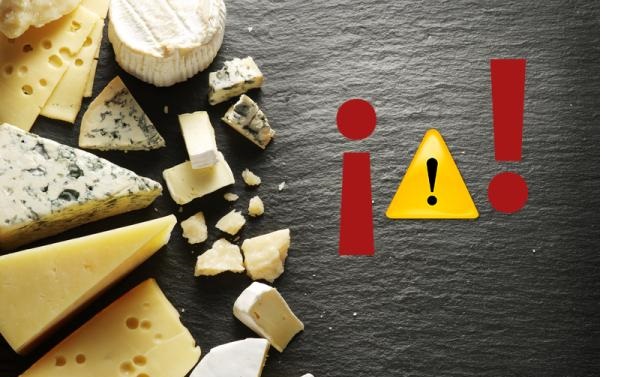Food allergies are becoming more frequent. And, among them, one of the most common are those related to dairy products, such as cheese. This food, along with the rest of dairy, in fact, is one of the most intolerant. And how do I know if I'm allergic to cheese? Obviously because there are clear symptoms that are perceived as soon as you eat it.

Before any of them, it is important to go to a doctor because cheese allergy can come from different ingredients that are not used in all these products. A reason why from we recommend that you always consult with an allergist to explain the symptoms you have had and detect if you are allergic to all cheeses or only to some classes.
Cheese allergies
Cheese allergy occurs when the body is in contact with chemical components, proteins and mold that are in this food. Faced with them, the body tries to protect itself with antibodies and histamines that are released to deal with allergens.
In the presence of these components, the body produces more histamines, which cause a series of symptoms such as inflammation of the airways, skin or eyes. You may also be interested in this other article on How a Food Allergy Develops.
Symptoms of cheese allergy
Cheese allergy manifests itself through different symptoms, which occur with greater or lesser intensity. In some cases, you may have all or only a few depending on the variety of cheese you have taken and your degree of allergy.
- Stomach upsets: These are the most common when you are allergic to cheese. There are people who notice nausea and vomiting shortly after eating it, while others feel them in the next two hours, coinciding with the digestion time. To these signs of hypersensitivity, other symptoms such as diarrhea are added when you are very allergic. Sometimes, this allergy manifests itself with episodes of constipation.
- Itching: This is another clear symptom that you are allergic to cheese. In general, it begins to be noticed in the mouth when saliva comes into contact with food. In some cases, this symptom is accompanied by hives, which appears anywhere on the body.
- Eczema: another clear symptom that you are allergic to this food. In this case, the red dots of the urticaria become reddened, thicker and drier areas on the skin that itch with greater intensity.
- Inflammation: this can also appear from cheese allergy. You can notice it in the mouth area, especially the lips and on the tongue, as well as in the throat. Likewise, it is felt in the parts of the body where hives or eczema may have appeared because the skin looks bulkier.
- Shortness of breath: This is a very common symptom in allergies and, in the case of cheese, it is no exception. If you are allergic, you will notice that you are short of breath or that you cannot breathe properly, even feeling a certain tightness in your chest.
- Anaphylactic shock: the clearest symptom of all. However, it occurs when you are very allergic. That is, you have a very serious allergy that even prevents you from touching the cheese. The appearance of symptoms is very rapid in this type of person, appearing within a few minutes of having been in contact with the product. Its manifestation can include from the aforementioned nausea, hives and respiratory problems to an increase in heart rate and even loss of consciousness. What's more, you can die.
I'm allergic to cheese, but what component?
There are several components of cheese that can cause the allergic reaction, and not all problems are caused by lactose, which is perhaps the best known.
- Lactose: it is the most common allergy in cheeses and dairy in general. If you are allergic to cheese because of it, you will notice that the symptoms are located in the digestive system. For example, you have nausea, abdominal bloating, cramping, and diarrhea.
- Mold: the one that is present on the outside of many cheeses, such as gorgonzola or the oldest, is one of the most frequent causes, producing mainly symptoms in the part of the mouth, throat, tongue and lips. Other signs that are concentrated in the head area may also appear, such as swelling of the face or conjunctivitis.
- Allergenic proteins: which are present in cheeses are another of the main causes of allergy. Specifically, casein and serum. Symptoms are manifested on the skin by hives and eczema, as well as in the digestive system. There are also breathing problems.
- Thiamine: this is a chemical found in all those dairy products that are fermented, such as processed and aged cheeses or those that are soy. Symptoms include eye and skin irritation, headache, shortness of breath, and increased heart rate, among others.
From we hope to have answered your question of how to know if I am allergic to cheese. Anyway, it is always recommended that you go to the doctor for any symptoms or suspicions. You may also be interested in this other article on What is the difference between allergy and intolerance.






